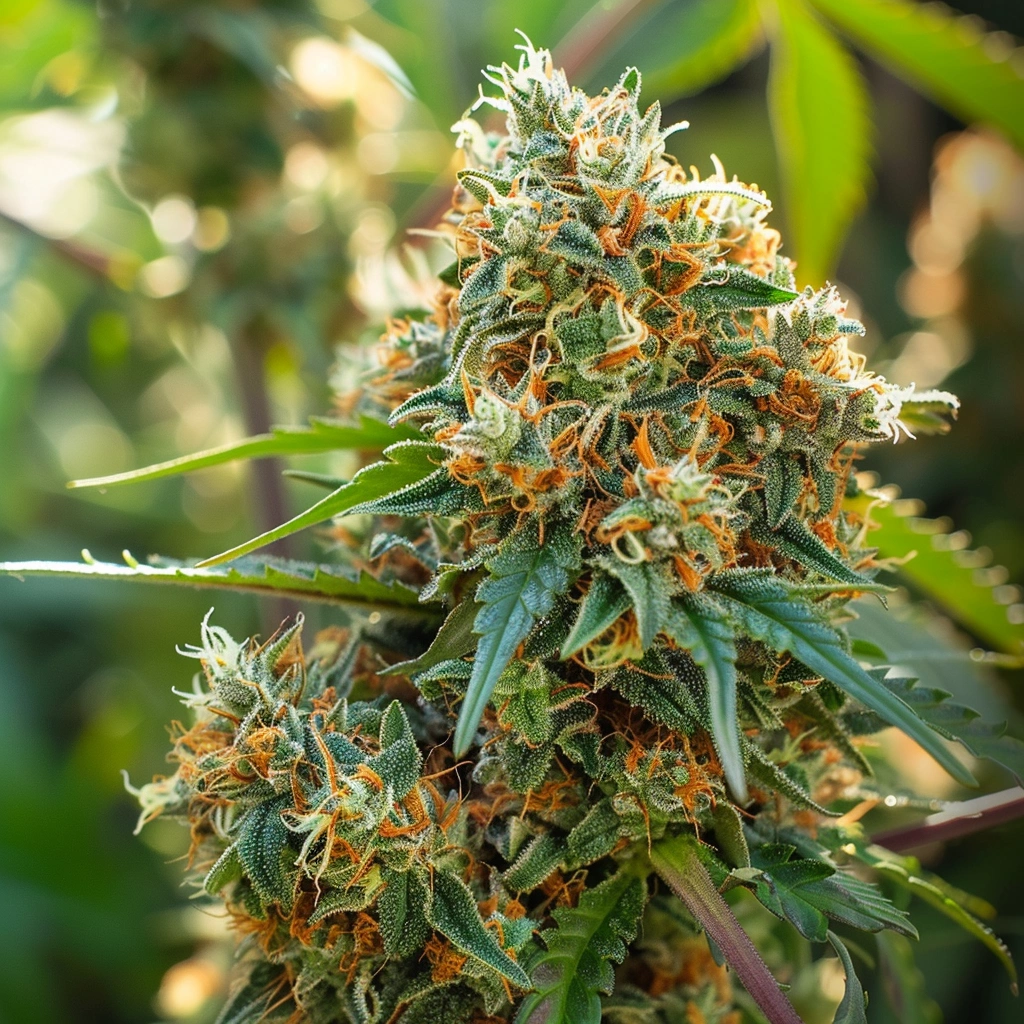Multiple sclerosis (MS), a relentless storm within the nervous system, disrupts the lives of millions worldwide. As the protective covering of nerve fibers, known as myelin, is progressively damaged, individuals face a spectrum of debilitating symptoms, from physical impairments to cognitive challenges. Amidst the myriad of therapeutic strategies, cannabis emerges as a beacon of hope, illuminating a path towards symptom relief and enhanced quality of life. This exploration delves into the profound impact of medical cannabis on MS treatment, highlighting its therapeutic potentials and the renewal it brings to those navigating this tumultuous journey.


Table of Contents
ToggleUnderstanding Multiple Sclerosis and Its Challenges
Multiple sclerosis is characterized by chronic inflammation, nerve damage, and resultant scars that interfere with the transmission of electrical signals within the central nervous system. Symptoms are unpredictable and vary widely among individuals but commonly include muscle spasticity, pain, fatigue, and impaired coordination. The traditional pharmaceutical arsenal offers treatments that manage symptoms and modify disease progression, yet these often come with significant side effects and incomplete relief.
The Rise of Cannabis in MS Management
In the search for comprehensive care, medical cannabis has gained prominence, supported by both anecdotal evidence and scientific research. Recognized for its neuroprotective and anti-inflammatory properties, cannabis offers a dual approach by potentially slowing disease progression and alleviating acute symptoms, providing a holistic treatment option for those with MS.


The Therapeutic Benefits of Cannabis in MS
Cannabis contains a multitude of active compounds, primarily cannabinoids like THC (tetrahydrocannabinol) and CBD (cannabidiol), which interact with the body’s endocannabinoid system (ECS). This system plays a crucial role in maintaining homeostasis and regulating immune response, making it a key target in MS treatment.
Alleviating Muscle Spasticity and Pain
One of the most celebrated benefits of cannabis in MS treatment is its efficacy in reducing muscle spasticity and pain, two of the most common and challenging symptoms. Cannabinoids engage the ECS to help relax muscles and alleviate pain. Clinical studies have shown that patients report significant reductions in spasticity and improvements in mobility with cannabis use.
Enhancing Sleep and Reducing Fatigue
Fatigue plagues the majority of those with MS, often hampering daily function and quality of life. Cannabis, particularly strains rich in CBD, has been found to improve sleep quality, thereby reducing fatigue and aiding in daily functioning. The sedative properties of certain cannabinoids can help reset the sleep cycle, which is often disrupted in MS.
Managing Depression and Anxiety
The psychological impact of MS is profound, with many individuals experiencing depression and anxiety as a result of chronic illness and disability. CBD is highly regarded for its anxiolytic effects, offering a natural alternative to antidepressants and anxiety medications, which can come with unwanted side effects and withdrawal symptoms.


Navigating Treatment: Strategies and Considerations
Incorporating cannabis into MS treatment requires a personalized approach, tailored to the unique symptom profile and disease progression of each individual.
Personalized Medicine: Tailoring Cannabis Treatment
Selecting the right cannabis strain and formulation is critical. High-CBD strains may benefit those with pain and psychiatric symptoms without the psychoactive effects of THC. In contrast, balanced THC:CBD products might be more effective for severe spasticity and pain management.
Routes of Administration
The method of cannabis delivery plays a significant role in its therapeutic effectiveness. Inhalation provides rapid relief, suitable for acute symptoms, while oral formulations like oils and capsules offer longer-lasting effects, beneficial for sustained symptom management.
Challenges and Regulatory Landscape
Despite its potential, the use of cannabis in MS treatment is not without challenges. Legal barriers continue to restrict access in many regions, and the stigma associated with cannabis use can deter patients and healthcare providers from considering it as a treatment option.
The Future of Cannabis in MS Therapy
As research evolves and societal attitudes shift, the role of cannabis in MS therapy continues to expand. Ongoing clinical trials and longitudinal studies are essential to uncover the long-term benefits and potential risks, paving the way for more targeted and effective cannabinoid-based therapies.
Conclusion: A Compassionate Ally in MS Care
Medical cannabis stands as a testament to the power of holistic medicine, offering not just symptom relief but also a potential to enhance overall well-being. For those with MS, cannabis offers more than therapeutic benefits; it provides a renewed sense of hope and empowerment, helping them navigate their condition with dignity and resilience. As we continue to explore and understand the full capabilities of cannabis, its integration into MS care represents a promising horizon, transforming the therapeutic landscape and offering a gentler path through the complexities of this chronic condition.
FAQ: Medical Cannabis for Multiple Sclerosis (MS) Treatment
How does medical cannabis help in managing Multiple Sclerosis (MS)?
Medical cannabis helps manage MS by interacting with the endocannabinoid system, which is involved in regulating inflammation, pain, muscle control, and nerve function. THC and CBD, the primary cannabinoids found in cannabis, have properties that can reduce muscle spasticity, alleviate pain, improve sleep, and decrease inflammation, thereby potentially slowing disease progression and improving quality of life.
Can medical cannabis cure Multiple Sclerosis?
No, medical cannabis does not cure Multiple Sclerosis. It is used to help manage symptoms associated with MS and to improve the quality of life for patients. There is no known cure for MS at this time, and treatment primarily focuses on disease management and symptom relief.
What symptoms of MS can medical cannabis treat?
Medical cannabis is commonly used to treat several symptoms of MS, including:
- Muscle spasticity and stiffness
- Chronic pain and neuropathic pain
- Insomnia and sleep disturbances
- Fatigue
- Anxiety and depression
Are there specific strains of cannabis recommended for MS?
While the best cannabis strain can vary depending on individual symptoms and responses, strains high in CBD are often recommended for their anti-inflammatory and pain-relieving properties without significant psychoactive effects. Strains with a balanced THC:CBD ratio may be beneficial for more severe symptoms such as acute pain and muscle spasticity.
What are the potential side effects of using cannabis for MS?
Potential side effects of cannabis can include cognitive impairment, dizziness, dry mouth, changes in mood, and psychoactive effects, particularly from THC-rich strains. Long-term use concerns include tolerance to the effects and potential impacts on mental health. It’s important to start with low doses and adjust based on personal tolerance and therapeutic needs.
How is medical cannabis administered for MS treatment?
Cannabis can be administered in several forms, including inhalation (smoking or vaporizing), oral ingestion (edibles, oils, tinctures), and topical applications. The choice of administration often depends on the desired onset and duration of effect as well as personal preference. For example, inhalation provides quick relief, whereas oral and topical forms offer longer-lasting effects.
Do I need a prescription to use medical cannabis for MS?
In regions where medical cannabis is legalized, it usually requires a prescription or recommendation from a healthcare provider. Patients typically must register for a medical cannabis program and receive an identification card that allows them to purchase cannabis from authorized dispensaries.
Can I use medical cannabis along with other MS medications?
Yes, many patients use medical cannabis in conjunction with other MS medications. However, it is crucial to consult with healthcare providers to ensure there are no adverse interactions and to coordinate an effective overall treatment strategy.
How quickly can I expect to see improvements in my MS symptoms with cannabis?
The onset of symptom relief can vary depending on the method of cannabis administration and individual patient factors. Inhalation methods can provide relief within minutes, while oral forms might take longer to manifest effects. Consistent usage over time is often necessary to realize the full benefits.
Is continuous use of cannabis safe for MS patients?
While many patients find ongoing relief with continuous use, the long-term safety of cannabis, particularly regarding cognitive function and mental health, is still under study. It’s essential for patients to undergo regular evaluations and adjust their treatment plans as needed under the guidance of their healthcare provider.
These FAQs provide a foundational understanding for MS patients and their families considering medical cannabis as part of their treatment regimen, highlighting its benefits and necessary precautions to maximize safety and effectiveness.
Kannabu's Online Cannabis Educational Resources
Read Educational Online Guides and Articles to Learn About Cannabis
- Navigating the Green Path: CBD vs. THC in Medical Treatment
- The Aromatic Architects of Healing: The Role of Terpenes in Medical Cannabis
- Navigating the Green Frontier: Clinical Trials on Cannabis and Its Effects
- Charting the Green Path: Cannabis Dosing Guidelines for Medical Use
- The Endocannabinoid System: Nature’s Balancing Act in Human Health
- A Green Horizon: Cannabis as an Alternative to Opioids
- Navigating the Mind’s Garden: Cannabis and Mental Health Treatment
- Unlocking the Green Code: Exploring the Genetic Diversity and Pharmacological Promise of Cannabis
- Weaving Green into Gold: The Integration of Medical Cannabis into Traditional Medicine
- The Therapeutic Promise of Medical Cannabis: Exploring the Spectrum of Cannabinoids
- From Young to Old: The Compassionate Embrace of Medical Cannabis in Pediatric and Geriatric Care
- Green vs. Traditional: Navigating the Crossroads of Medical Cannabis and Conventional Therapies
- Beyond the Pain: The Comparative Effectiveness of Cannabis in Chronic Pain Management
- Unlocking Cannabis’s Secrets: The Journey Through Cannabinoid Pharmacokinetics and Pharmacodynamics
- Green Paws: Navigating the Frontier of Medical Cannabis in Veterinary Care
- Unlocking Relief: The Transformative Role of Medical Cannabis in Pain Management
- Harnessing Harmony: Medical Cannabis and the Battle Against Autoimmune Disorders
- Embracing the Night: How Medical Cannabis Transforms Sleep Management
- Turning the Tide: Cannabis as a Catalyst for Relief and Recovery in Nausea and Appetite Stimulation
- Illuminating the Neural Pathways: The Transformative Role of Medical Cannabis in Neurological Conditions
- Harnessing Harmony: Medical Cannabis and the Battle Against Autoimmune Disorders
- A Clearer View: Medical Cannabis in the Treatment of Glaucoma
- Breaking Boundaries: Cannabis and the New Frontier in Epilepsy and Seizure Control
- Revolutionizing Relief: Medical Cannabis in Cancer Symptom Management
- Navigating the Storm: Cannabis as a Beacon of Hope in Multiple Sclerosis Treatment
- Cannabis: A Natural Respite for Arthritis and Joint Pain
- Healing from Within: The Role of Medical Cannabis in Treating Gastrointestinal Disorders
- Healing Invisible Wounds: Cannabis in PTSD and Trauma Treatment
- Balancing the Mind: The Potential of Medical Cannabis in Bipolar Disorder and Mood Stabilization
- Illuminating the Mind: Cannabis in the Treatment of Alzheimer’s and Neurodegenerative Diseases

